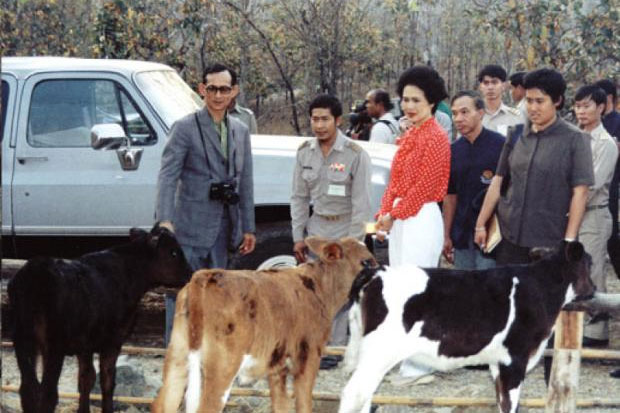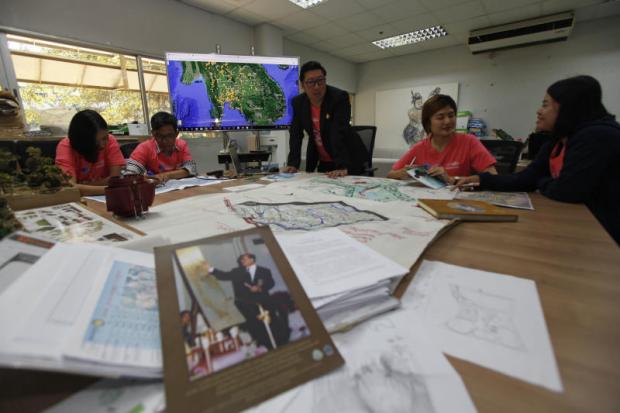
King Bhumibol Adulyadej passed away in October 2016 and left behind countless legacies for his people, including over 4,000 royal projects. To keep the royal principles and practices going -- especially the sufficiency-economy philosophy -- a group of more than 20 academics, led by Asst Prof Phichet Sowitthayasakun of King Mongkut's Institute of Technology Ladkrabang (KMITL), is establishing the Institute of Sufficiency Economy Philosophy (ISEP) to teach "the King's principles".
Asst Prof Phichet, former dean of KMITL's Faculty of Architecture, recalled that he took interest in and started learning about King Bhumibol's work and sufficiency-economy theory after the presentation of a United Nations award to the king in 2006.
"I have been impressed since May 26, 2006, when the UN secretary-general Kofi Annan presented the Human Development Lifetime Achievement Award to King Rama IX," Phichet said. "Earlier, I had thought that every king had worked the way he did. I later realised that he was not obliged to work that hard, but he did so because he cared for his people. And His Majesty the King continues his royal father's work."
The academic wants the planned ISEP to have campuses and classrooms in over 7,000 areas under the Khok Nong Na Model, and aims for 1 million spots nationwide.
"KMITL wishes to establish the Institute of Sufficiency Economy Philosophy [ISEP] as an independent university on its Ladkrabang campus. But I want the new university to have its campuses and classrooms in all troubled areas," he noted.
KMITL's Integrated Technology Operation Centre (ITOK), headed by Phichet, designs integrated farming landscapes for those in need. Such landscapes comprise ponds and waterways to be dug up to allow the supply of water that can be efficiently irrigated to farms all year round under the Khok Nong Na Model (Farmland, Reservoirs and Mounds Project). So far, the centre has designed farming landscapes for over 3,000 communities or people, while 35,000 others are awaiting their help.
A good example is Ban Huai Krathing Village in the Mae Ramat district of Tak, where integrated farming changed the lives of Karen villagers who almost lost their farmland, which was later declared part of a national park over a century after their settlement.
The integrated-farming-landscape design for the village has improved irrigation and increased water sources (by using the same system that King Bhumibol had designed for the Huai Hong Khrai Royal Development Project in Chiang Mai), supported reforestation and increased productivity without using heavy machines forbidden in forested areas. For instance, within eight months, incomes earned by local villagers there have risen from 40,000 baht per year per 57 rai plot of land to 84,315 baht per 10 rai plot, plus 700kg of rice for consumption. The amount of honey collected from the nearby forest has increased to 1,800 bottles per year, from about 200 bottles, due to more fertility.
Napatpan Fuangfoo is one of the nine architects who designed the Turning Point of Climate Change Project in 2014 by applying King Bhumibol's New Theory. The project later developed into the Khok Nong Na Model.
"From our work experience, the landscapes we have designed coincidentally turn out to be similar to farming spaces divided at the ratio of 30:30:30:10 under the New Theory because both are based on the same concept," he said.
King Bhumibol used the phrase "sufficiency economy" the first time in 1997, when Thailand was going through an economic crisis: "Sufficiency means self-supporting or having enough for ourselves."

A group of academics and researchers led by Asst Prof Phichet Sowitthayasakun has been working to develop rural communities in line with King Bhumibol Adulyadej's sufficiency-economy philosophy. Photo: VARUTH HIRUNYATHEB
In 1998, he remarked at his birthday speech: "The word 'self-sufficient' has a broader meaning, which is 'feeling your life is good enough' ... If people adhere to the principle of self-sufficiency -- living in moderation, being honest and not greedy -- they live happily. If they are well-off, they can have luxuries, but must not cause grievance to others."
King Bhumibol's New Theory is a good example of applying the sufficiency principle to agriculture. Land should be divided into four portions. The first 30% should be dug and turned into ponds for keeping rainwater for watering plants in dry season and feeding animals. The second 30% is for growing rice for consumption within the family. The third 30% is for growing fruit trees, vegetables, economic crops, herbs and more for consumption and sale. The rest is for living, animal raising, mushroom farming, fertiliser-making and more.
The next step is to encourage farmers to work together as groups or co-operatives to farm, perform marketing, find adequate food and clothes for themselves, find health and financial welfare for their communities, and support education and religion.
The third step is the way farmer groups find sources of money for investment and life-improvement. Farmers should be able to sell rice at fairly high prices and buy food and commodity goods in bulk at low prices, while loan sources and private firms can buy rice directly from farmers.
The New Theory enables farmers to stand on their own feet at a certain level by helping each other, having rice to eat all year round with no need to buy, and have enough water (1,000m³ per rai per year) for farming.
Back in 2006, Phichet had opportunities to attend lectures and read books about King Bhumibol's work and sufficiency-economy theory during his three months of monkhood after a mass ordination ceremony to mark the king's Golden Jubilee.
From 2006-07, he assisted work at the Bhumirak Dhamachart Project of the Royal Nature Conservative Centre in Nakhon Nayok, established by King Bhumibol for interested persons to learn about his sufficiency-economy principle and New Theory.
The lecturer obtained a master's degree in sustainable social development from Maejo University, Chiang Mai, in 2011. At Maejo, he learned more about King Bhumibol's work directly from some of those who served the king, such as Chaipattana Foundation secretary-general Sumet Tantivejkul and former Irrigation Department chief Pramote Maiklad. In 2012, he invited Wiwat Salyakamthorn, now deputy Agriculture and Cooperatives minister, to lecture his students further on the king's theories.
"There are five steps to understanding and adopting the king's principles. First, we must understand the sufficiency-economy theory, which is not against either capitalism or socialism but fits Thai culture. Second, we must know that King Rama IX created more than 40 new theories which are applicable to our designs. Third, we must study implementation approaches for over 4,000 royal projects carefully, follow suit strictly and never skip any procedure. Fourth, we must study and apply techniques, special tips and innovations from the royal projects to suit specific areas and local intellects. Fifth, we must prepare to work and brace for the worst shortages of resources," Phichet said.
Since 2012, Phichet and his team have been assisting projects, led by Wiwat and the Agri-Nature Foundation, to introduce the king's theories to rural areas. So far, the foundation has been running over 7,000 projects nationwide.
At present, the foundation's ao mue samakkhi (collaborative farming) project has at least 2,000 volunteers in 42 provinces who can be mobilised to work together to develop rural areas under the integrated-farming approach. Their tasks range from digging small ponds to retain more water to planting trees for reforestation, making organic fertiliser, improving soil quality and sowing seeds of plants.
According to him, the success has led to the Local Administration Department's interest in setting up training centres on King Bhumibol's principles in 7,852 local communities.
King Bhumibol's theories have been well-known and even spread to several foreign countries, such as Nigeria, which sought technical assistance from Thailand in establishing its Nigeria Self-Sufficiency Thai-African Rice City Project on an 32,400 hectare plot of land. The next countries to implement the theories are Brunei, Bhutan and China.
"Learning can be done everywhere. At ISEP, lecturers, experts and local scholars will teach students in each troubled area. Students will graduate after studying from real things and from practising. For example, the first year will be devoted to studying and implementing the principles, the second year to earning more income, and the fourth year to seeing clear results, such as by earning their living or changing treeless hills into forests. Data may be collected via drones as well."